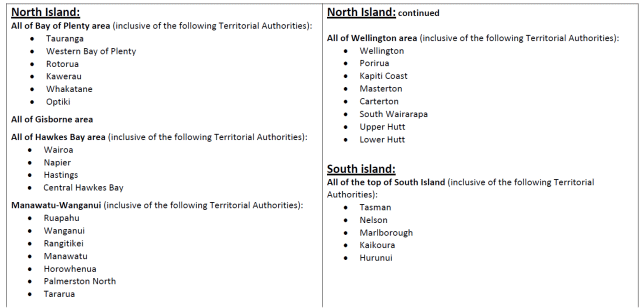Insuring houses tougher post quakes
Getting house insurance at settlement time has just got harder for property buyers with many insurers placing an embargo on new policies in parts of New Zealand following Sunday night’s earthquakes.
Thursday, November 17th 2016, 6:10AM

Most insurance companies – including Vero, IAG and Tower - have stopped providing new insurance policies on properties in certain parts of the country.
The areas affected cover the top half of the South Island and the bottom half of the North Island, including Christchurch, Wellington and the Bay of Plenty.
A Vero spokesperson said that, as a short-term measure, Vero has put in place a temporary embargo on new sales or policy amendments for certain areas of New Zealand, including the Bay of Plenty.
“This is industry practice and will allow us time to reassess our exposure to potential loss and to ensure that we can provide our customers with the right level of cover.
“Customers with an existing policy that requires changes are encouraged to speak with their broker or adviser, as there are some instances where the embargo will not affect policy changes.”
IAG, which owns AMI, State, NZI and Lumley, confirmed restrictions in the upper South Island from Rakaia to Masterton in the lower North Island.
Tower has been approached for comment, but had not responded at the time of publication.
Insurance Council chief executive Tim Grafton said insurers are working hard to minimise disruption to the availability of insurance for people putting offers on houses.
But there has been a freeze on new or increased insurance cover for people in many areas, he said.
“Globally, it is typical for insurers to place a widespread embargo on new business or requests to increase existing cover following significant natural events like earthquakes.
“These can narrow down very quickly as the concentration of losses is established, but in the worst hit areas this will take longer depending on the settling down of seismic activity.”
Following the 2013 Seddon earthquakes, insurers placed similar embargos on affected areas. Those embargos remained in place for a couple of months.
The problem with the situation is that failure to get an insurance policy can impact on the settlement of property transactions as insurance is a precondition for banks and other lenders.
Grafton said one option for people in such situations was to check and see if the vendor’s insurer will take over cover.
“Each insurer will have a different approach depending on their appetite for risk, so people should shop around.
“But take a three step approach and contact your own insurer first and then contact the vendor’s insurer, before shopping round further.”
However, one real estate agency is warning that many insurers are not allowing transfer of the insurance policy to the vendor on properties needing to settle post-earthquakes.
Tall Poppy director Sam McIntyre said that instead they are wanting to undertake new assessments and are sometimes requesting a new builder’s report.
This was a different approach to that taken following the Canterbury earthquakes in 2011 and was threatening settlements, he said.
“We expect the number of delayed settlements will grow exponentially over the coming week if we continue to experience severe aftershocks, as we have been.
“We also expect some house sales to fall through.”
McIntyre said people who were in the midst of a settlement process should contact their lawyer, insurer and real estate agent to confirm whether they are affected.
Loan Market adviser Bruce Patten says purchasers should ask the vendors to transfer their insurance on a property at settlement time.

| « Brokers unhappy with ASB's new refix process | Vincent Capital adds a South Island BDM » |
Special Offers
Comments from our readers
No comments yet
Sign In to add your comment
| Printable version | Email to a friend |



